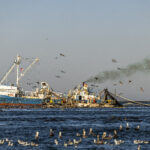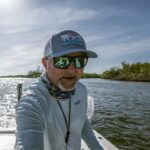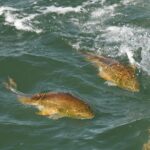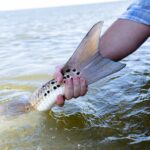
Gulf Menhaden Reduction Fishery: Bycatch Research & Useless Buffer Zones
Do you remember your driver’s test? How nervous were you when the instructor pulled out
For the last two years or so, the Bureau of Ocean Energy Management (BOEM) has been working towards a commercial offshore wind lease sale in the Gulf of Maine. We have had concerns. This past spring, BOEM released a Draft Call Area, opening a public comment period. The ASGA team took a lot of time and thought to comment on the Call Area and floating offshore wind development in general. Currently, BOEM is looking at nearly all of the Gulf of Maine to develop future lease(s); if final leases are selected, they will be smaller than the Call Area pictured below. Additionally, based on the Gulf of Maine’s depths, floating offshore wind structures will be used. This is a new, poorly understood, and highly concerning type of technology. The bottom line is that ASGA strongly opposes this proposal. . The world knows almost nothing about floating wind. We do not want the Gulf of Maine to be the proverbial guinea pig. The Gulf of Maine is pretty much one big Essential Fish Habitat area that has incredible ecological, economic, and cultural value. This development would absolutely be bad for all fishermen and the resource. If you want to do a deep dive into this issue, you can see our full comments here.

More importantly and extremely time sensitive, BOEM, in conjunction with Gulf of Maine states, announced several meetings to solicit input from fishing communities on potential offshore wind lease areas to inform a spatial modeling effort, which the agency hopes to use for final lease identification. It is critical that fishermen attend these meetings. It is even more critical that we provide coherent and science-based comments from our community. Due to poor recreational data resolution, BOEM often does not have a remotely adequate understanding of when, where, or why anglers fish. For example, we can look to the poor decisions BOEM made in identifying and approving commercial leases near and on top of Coxes Ledge. If you can attend one of the meetings, any input you can share about specific areas in the Gulf of Maine will help. Poor data going into these processes produces poor results. Please, be the smart person in the room. This is the perfect time to show BOEM that recreational anglers have a voice that needs to be heard. Be polite and respectful as our advocates always are in these arenas. Be a force for good and maybe we can push back enough to get this process shelved.
Here’s the schedule.
Portland, Maine
Ellsworth, Maine
Rockport, Maine
Portsmouth, New Hampshire
Plymouth, Massachusetts
Virtual Meeting For Massachusetts Fishing Community
If you can make any of these meetings, it would be a big help.
Our team at ASGA put together the information below to use as a guideline/cheat sheet:
Gulf of Maine Floating Offshore Wind Meeting Information
July 2023
Background:
ASGA Messaging:
If you have any questions, we are here to help–drop a comment or send us an email. This is our chance as the angling community to have our voice heard on this ill-conceived project.

Do you remember your driver’s test? How nervous were you when the instructor pulled out

If you’ve spent any time on the water in South Florida, chances are you’ve heard

Photo Credit: Graham Tayloe Big Win for Redfish in Alabama Huge news from the Marine

Feature Photo: Carter Abramson | Simms Fishing at the Fisheries Science Symposium We have more
We rely on our members and donations to keep fighting for a sustainable tomorrow in marine conservation.
GIVE THE GIFT OF FISHERIES CONSERVATION THIS HOLIDAY SEASON. SHOP ASGA GOODS THAT FUND FISHERIES RESEARCH & ADVOCACY CAMPAIGNS
JOIN ASGA IN CALLING FOR CRITICAL MANAGEMENT ACTION AFTER YEARS OF SPAWN FAILURES & POOR MANAGEMENT.
By using this website, you agree to our use of cookies. We use cookies to provide you with a great experience and to help our website run effectively. To learn more, please review our privacy policy.